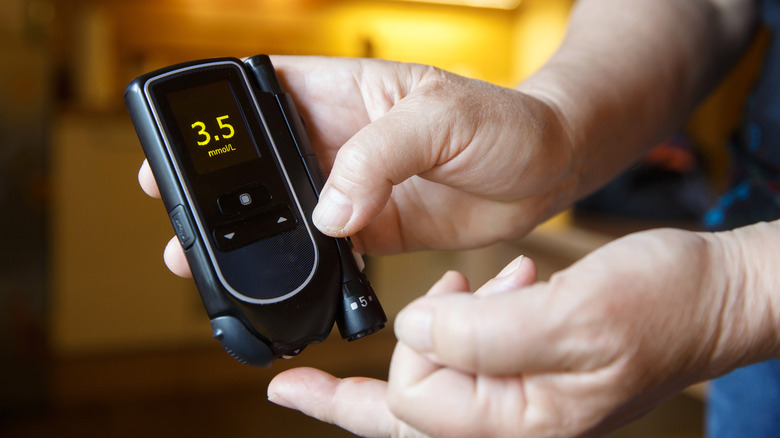What It Means When You're Always Craving Fruit
You've been craving a bowl of mixed fruit for the past week or so. The moment the sweet nectar hits your mouth, it's impossible not to sigh in delight. Your craving for blueberries and cotton candy grapes is new. You're beginning to wonder if your body is trying to give you a sign that something is missing.
It would be easy to link a craving for fruit with a nutrition deficiency, but the science doesn't hold up, according to Healthline – and the reason is due to the nature of fruit cravings themselves. For example, research in the International Journal of Eating Disorders showed that women were nearly twice as likely to experience food cravings as men. There was a strong association between food cravings and mood. So, it's more plausible for your cravings to illustrate a shift in hormones, dietary restriction, and low blood sugar.
Get an understanding of your internal mind and cravings by exploring different triggers that make your mouth water for various fruits. You might also be interested to learn that not succumbing to your desire can make it disappear. It's all science, after all.
Hormonal changes lead to craving fruit
When it comes to understanding the reason behind fruit cravings, the calendar is one of the first places you should look. For starters, hormonal changes around a period could be responsible. A 2016 study in The FASEB Journal showed that specific food cravings during your menstrual cycle are due to steroid fluctuations within the body. The results showed that an increase in progesterone or leptin could cause an increase in cravings for sweet foods and juices, making it impossible for you to get enough of your favorite strawberry smoothie.
Healthline points out that it's not all about steroids, though. Your period can take a toll on an individual's emotions, making them cry one second and frustrated the next. However, when you eat sweet foods, you get a little serotonin boost in your brain. Finding some happiness within your bouts of sadness and frustration can have you reaching for those sweet apples and grapes.
Hormone fluctuations during your menstrual cycle can create chaos in your appetite, but this also happens when a person is pregnant. Research published in Frontiers in Psychology showed that up to 90% of pregnant individuals in the United States deal with cravings. Fruit and fruit juice were high on the list of cravings at 18.8%. The most craved food was sweets, so fruit is a great alternative. Hormonal-related cravings aren't dangerous, but it's essential to eat everything, including fruit, in moderation.
Fruit cravings might hint at low blood sugar
Did you ever forget to eat and crave something sweet? It could be a chocolate bar or perhaps an apple that has your mouth watering. Fruit cravings that happen occasionally after not eating for a while could mean your blood sugar is low.
Blood sugar, also known as blood glucose, is the sugar you use for energy in your blood (via Medline Plus). The fluctuation of your blood sugar tells your pancreas to make insulin and keep everything in check. Those with diabetes have an issue where insulin production is out of sync, so their blood sugar is much higher than it should be. Low blood sugar can be a complication for those who are treating their diabetes with insulin. However, some people have abnormally low glucose levels without diabetes for various reasons. A study in Physiology & Behavior found those with low blood sugar can have intense cravings for foods high in carbohydrates, including fruits. So, you might want to test your blood sugar.
Cravings for the sweet stuff aren't going to be the only sign that your blood sugar is amiss. You might also notice that you feel a bit shaky or hungry. Some people with hypoglycemia even start to sweat. Grabbing a pear or orange helps to bring your sugar back up and alleviate the symptoms. According to NHS Inform, low blood sugar can lead to an emergency situation, so it's vital to treat it.
Food restriction causes you to crave fruit
According to Scientific American, eating is typically done for pleasure. While it's also important to pay attention to hunger cues, cravings come down to having a pleasurable eating experience. That's why, when you can't have a particular food, you crave it. A 2020 study in Current Nutrition Reports showed that cravings for food like fruit can increase in the short term when they are restricted from your diet. For example, those on a keto diet might seriously limit or cut out fruit altogether. So they can crave it. This craving might also happen when you limit some fruit from your diet. For example, strawberries are out of season, so you now crave them since they aren't regularly available.
The study also showed that long-term food restriction could reduce fruit cravings. Since craving food is a learned behavior, the longer you keep it out of your diet, the less you'll crave it. Sticking to your guns and not giving in can stop the craving. Just remember, fruits are an important source of minerals and fiber, so some in moderation is good for you.
Craving fruits can seem like your body is trying to tell you something. Sometimes, it might warn you that your blood sugar is low. However, cravings for fruit can be due to your hormones or your natural need for something you're restricting.




